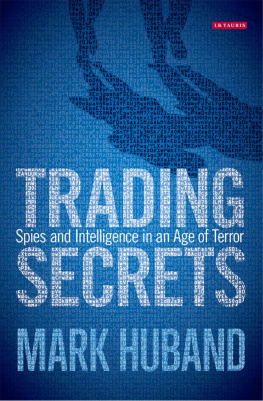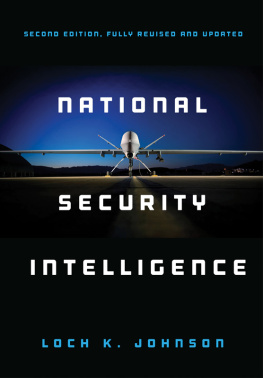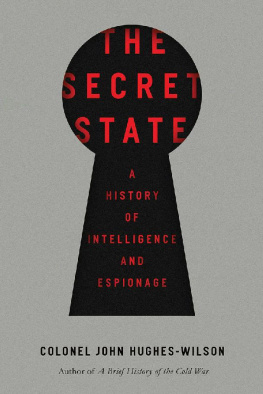All rights reserved, including the right to reproduce this book or portions thereof in any form whatsoever. For information address Simon & Schuster Subsidiary Rights Department, 1230 Avenue of the Americas, New York, NY 10020
SIMON & SCHUSTER and colophon are registered trademarks of Simon & Schuster, Inc.
Shorrock, Tim.
Spies for hire: the secret world of intelligence outsourcing /
Tim Shorrock.1st Simon & Schuster hardcover ed.
p. cm.
Includes bibliographical references and index.
1. Intelligence serviceContracting outUnited States. 2. Intelligence service United States. 3. National securityUnited States. 4. United StatesForeign relations1989. 5. United StatesMilitary policy. I. Title.
JK468.I6S49 2008
327.1273dc22 2008006900
ISBN-13: 978-1-4165-5351-9
ISBN-10: 1-4165-5351-7
Prologue
ON MAY 9, 2006, John Humphrey, a former CIA officer making his way up the management ladder of one of the nations largest intelligence contractors, made a stunning disclosure to Intelcon, a national intelligence conference and exhibition at a hotel in Bethesda, Maryland. Outsourcing, Humphrey declared, was out of control. Contractors deployed in Iraq and other hotspots overseas were making decisions and handling documents that, in earlier times, had been the sole responsibility of U.S. military and intelligence officers. This had caused a paradigm shift in the relationship between government and the private sector, and left companies like his in an untenable position.
Five years ago, youd never have a contractor supporting an operation on the field where theyre making a recommendation to an officer, said Humphrey. Nor would you find a contractor making little contributions here and there in the reports intelligence officers sent back to Washington. This concerns me a lot, the way these lines are blurring, he went on. We shouldnt be involved in some of these intelligence operations, or the planning, or the interrogations and what have you. Unless government started taking more responsibility in the field, he warned, the blowback for the contracting industry could be profound.
The intelligence professionals in the room looked stunned. They had just sat through two days of upbeat discussions about the annual $10-billion expansion of U.S. intelligence budgets and the opportunities that money presented for defense contractors, information technology vendors, and former national security officials who still held their top secret security clearances. Upstairs in the exhibition hall, thirty-five companies were displaying the latest high-tech spying equipment and competing to recruit new employees, who could earn up to three times government pay by migrating to the private sector. Words like blowback did not come easily at such gatherings.
But this speaker, and the corporation he represented, had an exceptional story to tell. Humphrey was employed by CACI International Inc., a $1.8-billion information technology (IT) company that does more than 70 percent of its business with the Department of Defense. For many years, CACI had been one of the Pentagons favorite contractors. It was particularly respected for its professional evaluations of software and IT products supplied to the military by outside vendors. During the late 1990s, CACI moved heavily into military intelligence when the Pentagon, its budget reduced by nearly 30 percent from the days of the Cold War and unhappy with the quality of intelligence it was getting from the CIA, began bringing in private sector analysts for the first time.
This proved to be a prescient move for CACI when nineteen Muslim fanatics linked to Al Qaeda, the global terrorist organization then based in Afghanistan, steered three hijacked jetliners into the World Trade Center and the Pentagon on September 11, 2001. In the aftermath of the worst terrorist attack in American history, the Intelligence Community began scouring Washington for analysts, covert operatives, translators, and interrogators it could deploy in the hunt for the perpetrators, and to fill the ranks of hastily organized counterintelligence centers at the Central Intelligence Agency and other government agencies. CACI, which already had a small army of trained and cleared intelligence specialists holding security clearances, was perfectly positioned to pick up the slack.
Between 2002 and 2006, CACI signed dozens of new contracts, acquired twelve companies, and more than tripled its revenue, from $564 million a year to nearly $2 billion. Its astonishing growth catapulted the company from a bit role in IT to one of the key players in what has become a $50-billion-a-year Intelligence-Industrial Complex. CACI is a cash-flow story, Dave Dragics, CACIs chief operating officer, boasted to investors in 2006. Whenever you hear bad news, its usually good news for us.
But along the road to this gravy train, CACI stumbled. The trouble began in the summer of 2003, when Donald Rumsfelds Pentagon, shocked by the resistance to its occupation of Iraq, began filling Iraqi prisons with thousands of people suspected of participating in the insurgency. The U.S. Army, however, was desperately short of interrogators, particularly anyone with military experience. Through the Department of the Interior, which had subcontracted management of the Pentagons IT contracts in 2001, the Army renewed several contracts it had signed during the Bosnian war with Premier Technology Group, a small intelligence shop that CACI acquired in 2003. Within weeks of CACIs acquisition, its PTG unit dispatched two dozen former military interrogators and prison guards to Baghdads Abu Ghraib prison. Many of them were unaware of the nature of the work they would face.
Tasked with the job of rooting out the leaders of the insurgency, some CACI employees directed military interrogators to use techniques on Iraqi prisoners that were, to put it mildly, far outside the norm of civilized conduct. Reports of the mistreatment soon made their way to U.S. commanders in Iraq, who appointed an Army general to investigate conditions at the prison. In the spring of 2004, CACI was thrust into the public limelight when the Armys report, along with hundreds of graphic photographs of Iraqis being tortured and humiliated, were leaked to the press. The Bush administration was thrust into one of its most serious foreign policy crises. After leaving the Pentagon in 2006, Rumsfeld would call Abu Ghraib the worst thing that happened during his five and a half years as secretary of defense (despite being the architect of the U.S. occupation of Iraq, however, he never took responsibility for the actions of his soldiers and contractors).
The details of what CACIs people did at Abu Ghraib were the subject of an insightful book, Chain of Command: The Road from 9/11 to Abu Ghraib , by Seymour Hersh, the reporter who broke the Abu Ghraib story, and the events recalled in excruciating detail by former Iraqi prisoners in a 2007 film made by Hollywood producer Robert Greenwald called Iraq for Sale: The War Profiteers . Two internal Army reports concluded that CACIs contract interrogators introduced some of the most brutal practices employed at the prison, including the use of attack dogs. The images of one naked prisoner, cringing in terror as a German shepherd snapped his teeth just inches from the mans genitals, horrified the world. Combined with the testimony of several guards who followed the orders of the CACI and Army interrogators, the pictures convinced U.S. military tribunals to convict two of the dog handlers for assault. But no case was ever made against CACIs men: even though one of CACIs employees, a former prison guard named Steven Stefanowicz, was identified at trial as suggesting the use of the dogs, he has never been charged with a crime. Nor has CACI itself.











